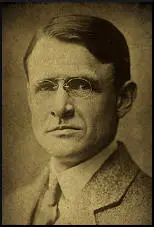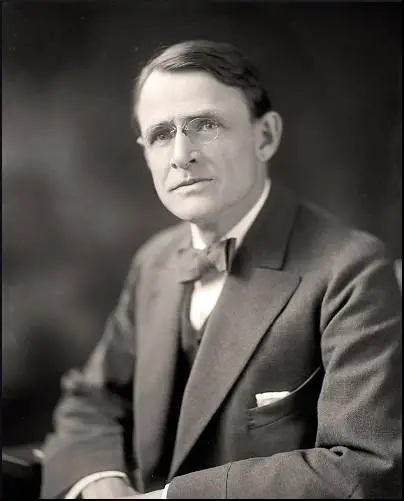Frederic C. Howe

Frederic Clemson Howe, the son of Andrew Jackson and Jane Clemson Howe, was born in Meadville, Pennsylvania, on 21st November, 1867. He was educated at Allegheny College and completed his Ph.D. at Johns Hopkins University in 1892.
In 1894 he moved to Cleveland and found work for the law firm of Harry & Jas. Garfield. He became a partner in 1896. Howe developed progressive political views and became active in the Goodrich Social Settlement. (1)
A member of the Republican Party in 1901 he attempted to be elected to the city council. In 1904 he married Marie H. Jenney, a Unitarian minister and prominent feminist. Howe became a supporter of women's suffrage. He wrote: "I want woman suffrage because it will also free men... I want woman suffrage for what it will do for woman, for what it will do for men, for what it will do for the muddle we have made of politics... I cannot myself be happy in a world where there is so much poverty, so much hunger, so much suffering that can be so easily be cured." (2)
Frederic C. Howe - Reformer
Over the next few years he published several books including The City: The Hope for Democracy (1905); The Confessions of a Monopolist (1906), The British City: The Beginnings of Democracy (1907). He moved to New York City where he became director of the People's Institute (1911-1914) and commissioner of immigration for the port (1914-1919). (3) Other books by Howe included The Land and the Soldier (1919), The Only Possible Peace (1919), Revolution and Democracy (1921) and The Confessions of a Reformer (1925).
In 1932 Howe joined with George Norris, Harold Ickes, Felix Frankfurter, Donald Richberg, Edward Costigan, Grace Abbott, Paul Kellogg, Amos Pinchot, and Peter Witt, to establish the National Progressive League. The main objective of the group was support the Democratic Party nominee Franklin D. Roosevelt for president. The organization disbanded following Roosevelt election victory.

Frederic C. Howe told his friend Jerome Frank, that he "was eager to come to Washington". (4) As Kenneth E. Miller, the author of From Progressive to New Dealer: Frederic C. Howe and American Liberalism (2010): "His (Frederic C. Howe) own political weight was not great enough for him to claim a major post like a seat in the cabinet, but a chance to be the tribune of the consumers - and to have a voice in defining that role - must have appealed to him. After all, it would be the first attempt by the national government formally to take account of the consumer interest, save for a few piecemeal interventions like the Food and Drug Act of 1906." (5)
Agricultural Adjustment Administration
On 27th July, 1933, George N. Peek, head of the Agricultural Adjustment Administration (AAA) appointed Howe the head of the Consumers' Counsel. Peek later recalled that the appointment of Howe and Jerome Frank, the AAA's general counsel was "one of the two big mistakes he had made setting up the AAA." (6) Howe associated with other left-wing members of the Roosevelt administration. This included Frank, Adlai Stevenson, Alger Hiss, Hope Hale Davis, Lee Pressman and Gardner Jackson. Peek claimed that the AAA "was crawling with... fanatic-like... socialists and internationalists."
Elizabeth Dilling included Frederic C. Howe in her books, The Red Network: A Who's Who of Radicalism for Patriots (1934) and The Roosevelt Red Record and Its Background (1936). Dilling argued that officials in Roosevelt's administration were associated with members of the Communist Party of the United States. She also claimed that Eleanor Roosevelt was a "socialist sympathizer and associate, pacifist". During this period she became associated with Father Charles Coughlin.
Out of Office
Chester R. Davis replaced George N. Peek as head of the Agricultural Adjustment Administration (AAA). He was determined to remove the left-wing elements in the AAA. In February 1935, Davis insisted that Jerome Frank and Alger Hiss should be dismissed. Davis told Frank "I've had a chance to watch you and I think you are an outright revolutionary, whether you realize it or not".
Henry A. Wallace, the Secretary of Agriculture was unable to protect them: "I had no doubt that Frank and Hiss were animated by the highest motives, but their lack of agricultural background exposed them to the danger of going to absurd lengths... I was convinced that from a legal point of view they had nothing to stand on and that they allowed their social preconceptions to lead them to something which was not only indefensible from a practical, agricultural point of view, but also bad law." Raymond Gram Swing, wrote in the Nation Magazine that Wallace had shown himself unwilling to stand up to big producers and agribusiness and seize "economic power from the interests in agriculture who hold it."
Rexford Tugwell claimed that Howe was "the subject of vitriolic attacks by the business interests" and was "pictured as a Red". (7) Davis now decided to get rid of Howe. He later recalled: "Fred Howe was a man of high ideals and very practical sense. He was the 'turn the other cheek' type. He was a well-meaning man who permitted his organization to be loaded down with a group of people who were more concerned with stirring up discontent than they were with achieving the objectives of the act." (8)
Time Magazine reported: "In AAA's Information Division, Consumers' Counsel Frederick C. Howe and Gardner Jackson slashed about them in the name of the consumer. Slow and steady Mr. Davis was not at home among such assistants, was not prepared to go their radical lengths. He held his hand, but the time came when the ax had to fall... One murky evening last week a mimeographed sheet announced a reorganization of AAA." (9)
Hope Hale Davis worked for Howe and believed he did a great job as the head of the Consumers' Counsel and was extremely upset when he was forced to resign from the AAA in 1935. Davis commented "he had been dismissed for no other reason than that he had tried to protect the consumer, as the law required." (10) Howe told Gardner Jackson at the time: "The political state is a very difficult institution, but not as inefficient, wasteful and dishonest an institution as many people believe. And it heightens greatly my belief and confidence in democracy that I can say at the end of nearly two years working with you and twenty other men and women that there has been a high degree of efficiency and an equally high degree of devotedness and intellectual integrity as to which not even a question has been asked." (11)
Frederic C. Howe died in Martha's Vineyard on 3rd August, 1940, and was buried in Meadville, Pennsylvania.
Primary Sources
(1) Kenneth E. Miller, From Progressive to New Dealer: Frederic C. Howe and American Liberalism (2010)
His (Frederic C. Howe) own political weight was not great enough for him to claim a major post like a seat in the cabinet, but a chance to be the tribune of the consumers - and to have a voice in defining that role - must have appealed to him. After all, it would be the first attempt by the national government formally to take account of the consumer interest, save for a few piecemeal interventions like the Food and Drug Act of 1906.
(2) Frederic C. Howe, letter to Gardner Jackson (7th February 1935)
The political state is a very difficult institution, but not as inefficient, wasteful and dishonest an institution as many people believe. And it heightens greatly my belief and confidence in democracy that I can say at the end of nearly two years working with you and twenty other men and women that there has been a high degree of efficiency and an equally high degree of devotedness and intellectual integrity as to which not even a question has been asked.
(3) Time Magazine (18th February, 1935)
Although Tugwell's tongue won the Brain Trust fame with the public, another, even more voluble tongue, won the Brain Trust fame in many a Washington drawing room - the tongue of Jerome Frank. That restless young Jewish lawyer - who was a brain truster to Mayor Dever's Chicago reform administration; whose early drawing room sallies were in the homes of such Midwest literary liberals as Floyd Dell, Sherwood Anderson, Harriet Munroe; whom Communist Emma Goldman calls "Jerry"; whose shrewdness won him a place in the Manhattan law firm of Chadbourne, Stanchfield & Levy; whose brilliant articles on judicial psychology led him to friendship with Felix Frankfurter - was like a can of TNT dropped into a Washington drawing room. He turned his deep burning eyes on his fellow guests and unleashed his facile tongue for the sport of bating reactionaries. Nothing did he enjoy more than predicting the swift destruction which the Administration would wreak on the established order. When he passed, Tory hearts lay beneath their starched shirt fronts palpitating and bleeding. He was the making of many a party.
As counsel to AAA he was also a thorn in the paw of sturdy George Peek, his boss. Mr. Peek protested to Secretary Wallace. In vain, for Counsel Frank had Felix Frankfurter's approval and the support of Dr. Tugwell. So Mr. Peek, instead of using his legal counselor, hired his own lawyer out of his own pocket. But Thorn Frank was too pointed for his flesh. The time came when Mr. Peek gave Mr. Wallace the choice of accepting his own resignation or Frank's. With the advice of Dr. Tugwell and the consent of the President, Mr. Wallace accepted Mr. Peek's .
At In Mr. Peek's place, Chester C. Davis took charge of AAA. "Chet" Davis is not a man of Mr. Peek's sort, not a man of Mr. Frank's. Economically he stood somewhat closer to Jerome Frank, but he was a middle-of-the-roader in economics and in disposition. In AAA's legal department Frank and his satellites, including Francis Shea, Lee Pressman, Victor Rotnem, flashed their rapiers, determined to slice the profits off processors and middlemen and present them to the farmers. In AAA's Information Division, Consumers' Counsel Frederick C. Howe and Gardner Jackson slashed about them in the name of the consumer. Slow and steady Mr. Davis was not at home among such assistants, was not prepared to go their radical lengths. He held his hand, but the time came when the ax had to fall.
One murky evening last week a mimeographed sheet announced a reorganization of AAA. Mr. Frank, who had shocked so many Tories, was shocked. He and his friends were fired without warning. Frederick Howe was demoted. The Brain Trust was so completely taken by surprise that it had no rebuttal. And Dr. Tugwell, alas, was in Florida. Only next day did the full significance of the event dawn upon Washington.
Secretary Wallace and Administrator Davis received a hundred newshawks. For an hour the two were cross-examined. They spoke with circumspection but they denied nothing. The Brain Trusters of AAA had been ousted because Messrs. Davis and Wallace had had enough of them. The action had been discussed for two months.
References
(1) The Encyclopedia of Cleveland History (1998)
(2) Frederic C. Howe, Collier's Weekly (1917)
(3) The Encyclopedia of Cleveland History (1998)
(4) Rexford Tugwell, Roosevelt's Revolution (1977) page 122
(5) Kenneth E. Miller, From Progressive to New Dealer: Frederic C. Howe and American Liberalism (2010) page 382
(6) George N. Peek, Why Quit Our Own (1936) page 107
(7) Rexford Tugwell, Roosevelt's Revolution (1977) page 355
(8) Chester R. Davis, Reminiscences (1953) page 313
(9) Time Magazine (18th February, 1935)
(10) Hope Hale Davis, Great Day Coming: A Memoir of the 1930s (1994) page 77
(11) Frederic C. Howe, letter to Gardner Jackson (7th February 1935)
